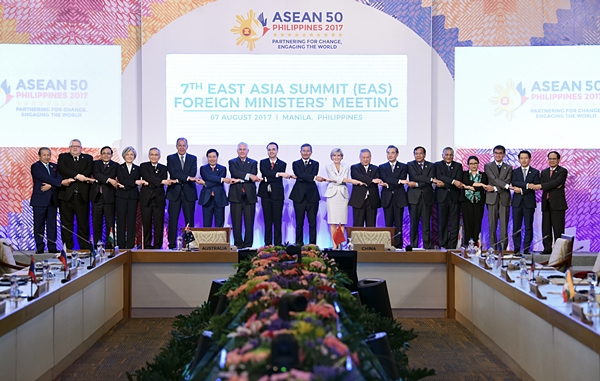-
About the Ministry
About the Ministry
- Press
- Countries & Regions
- Policy Information
- Life In Korea
Ministry News
- Notices
- Ministry News
- Press Releases
- Press Briefings
- Speeches & Published Materials
- Newsletter Service
- Diplomatic White Paper
Outcome of Foreign Ministerial Meeting of East Asia Summit
- Date
- 2017-08-08
- hit
- 731

1. Foreign Minister Kang Kyung-wha attended the seventh foreign ministerial meeting of the East Asia Summit (EAS) in Manila, the Philippines, on August 7, during which she exchanged views with the other top diplomats on the EAS’ way forward as well as the situations on the Korean Peninsula and in East Asia and the international community.
° The EAS meeting brought together the foreign ministers of the ten member states of ASEAN, Secretary of State Tillerson of the US, Foreign Ministers Wang Yi, Kono, Lavrov, Bishop and Brownlee of China, Japan, Russia, Australia and New Zealand, respectively, and Secretary of State Singh of India.
※ The EAS is comprised of the ten member states of ASEAN, the Republic of Korea, China, Japan, the US, Russia, Australia, New Zealand and India.
※ The EAS summit was first held in 2005, and its 12th round will take place in November. Meanwhile, the EAS convened informal foreign ministerial meetings in the first six years following its launch. Starting with its first foreign ministerial meeting in 2011, the EAS has been holding the meeting in the form of formal meeting.
2. Minister Kang stressed that it is important for achieving the EAS members’ shared goal of peace and prosperity in East Asia that the role of the EAS be expanded as the premier strategic forum participated by all the major countries in the region; and that in particular, amid the emergence of various actors and cross-border challenges, the EAS should broaden the scope of cooperation among its members.
° In addition, the Minister, citing the recent Marawi situation, brought attention to growing terrorism threats in East Asia and urged the EAS members to work together in addressing the issue. She went on to mention the ROK government’s efforts to share its experiences in responding to terrorism and violent extremism.
3. With regard to the rapidly growing nuclear and missile threats from North Korea, Minister Kang highlighted the need to respond to them with tough sanctions and pressure on the North. Welcoming the adoption on August 5 of a new Security Council resolution, she stressed that the international community needs to send to North Korea a joint message that it will not tolerate a nuclear North Korea; that the Korean Peninsula should be denuclearized in a complete, verifiable and irreversible manner through peaceful approaches; and that if and when the North makes the right choice, it could have a bright future.
° In addition, the Minister called on North Korea to accept the ROK government’s “Berlin initiative” and proposal (for talks) made on July 17, asking for support and cooperation of the EAS member states in this regard.
4. The majority of the participants highlighted the principle of zero tolerance for a nuclear North Korea; condemned in strong terms continued provocations by the North that are heightening tensions in the region; urged the North to immediately and thoroughly implement the relevant Security Council resolutions; and expressed support for the ROK government’s efforts to improve its relations with the North and to build permanent peace on the Korean Peninsula.
5. In addition, with regard to the South China Sea issue, a number of the foreign ministers urged the countries concerned to make efforts to guarantee the freedom of navigation and overflight in the area and to resolve the dispute in a peaceful way, taking note of the recent agreement reached between China and ASEAN on a framework for the code of conduct in the South China Sea.
6. Also, the participants noted that the statements on chemical weapons, terrorism and poverty alleviation, which are being worked on for adoption at the EAS summit in November, are an appropriate response to pending issues of the international community, and agreed to hold constructive discussions with the goal of wrapping up the consultations on the texts before the summit meeting.
° Welcoming the launch of the EAS ambassadorial meeting mechanism and the establishment of a division for EAS affairs at the ASEAN Secretariat in 2016 as well as other progress in the efforts to institutionalize the EAS, the ranking officials agreed to seek further development of the EAS as a strategic forum.
7. The EAS forum was launched 2005 for leaders of East Asian countries to engage in candid policy dialogue on major strategic and political issues in the region. In 2011, the US and Russia became members of the forum, making it the premier strategic forum in the Asia-Pacific region with all of the major countries in the region as its participants.
* unofficial translation




